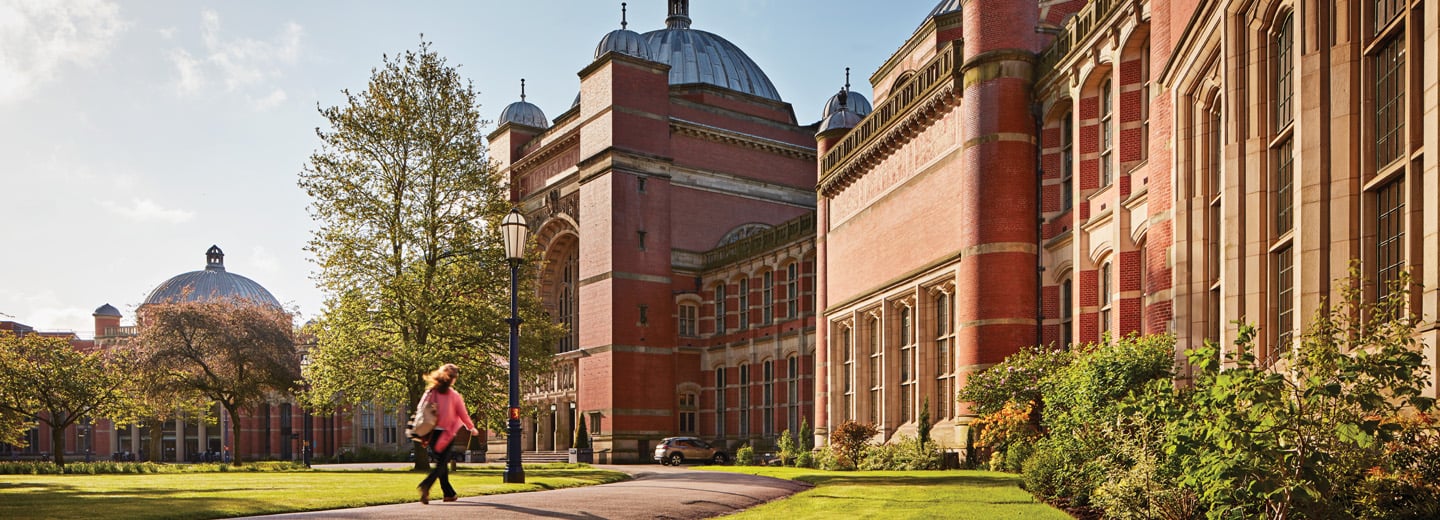Online MBA

Make an impact at the highest level
Become a responsible, reflective, and resilient global business leader for the future with an AMBA-accredited, global top 15 Online MBA (Financial Times 2025) from Birmingham Business School.
Learn more today
Keen to learn more? Our expert team is ready to answer any questions you may have.
We can also communicate with you via WhatsApp. Please let us know if you would like to be contacted this way in our initial communication with you and we will update your preferences.
Quick facts
international – students studying overseas in more than 90 different countries
total programme fee. This can be paid in full or in instalments of £1,945 per module
first 100% Online MBA to be accredited by the Association of MBAs (AMBA)
Study online at a top business school
Join the University of Birmingham’s online MBA to gain advanced skills in responsible business practices. Study online to receive the same degree certificate as campus students and graduate ready to become a transformative leader in the modern business world.
The Birmingham MBA prepares graduates for career advancement through practice-based assignments and convenient online modules designed by distinguished experts in the field. Tailor your learning by choosing from two specialisms and three pathways to graduate with the knowledge you need for your desired career path.
This programme is part of a range of MBAs run through the Birmingham Business School, the UK’s oldest business school. As well as being acclaimed internationally, it appears regularly in global league tables and holds the rare ‘gold standard’ triple-crown accreditation.

Rankings and accreditation
- Ranked top 15 Online MBA in the world (Financial Times 2025)
- Online MBA ranked 32nd in the world and 7th in the UK (QS 2026)
- First AMBA-accredited online MBA
- Birmingham Business School holds a rare ‘gold standard’ triple-crown accreditation
More information about this programme
Click on each tab below for more information about admissions, curriculum and tuition fees.
Curriculum
Hands-on learning with practice-based assignments
14 modules
180 credits
In convenient online modules, you’ll engage with a small, diverse group of peers to gain global insights and varied perspectives on modern business topics. Study a modern curriculum that emphasises curiosity, thought leadership and responsible business skills while preparing you for career advancement opportunities.
Curriculum highlights
- Responsible Business
- Purposeful Leader
- Strategy in a Complex and Uncertain World
- People Management and Organisations
- MBA Company Project
Entry criteria
- Start dates: February | July | October
For entry to the online MBA, you must have obtained (or be predicted to obtain) an upper second-class degree from a UK university OR an equivalent qualification from a recognised institution. Given the nature of this programme, applicants should have five years of professional management experience or at least three years in cases of exceptional potential.
If English is not your first language, you will also need to supply an up-to-date English language certificate. We accept an academic IELTS with a score of 6.5 and no less than 6.0 in any band. Other language test scores are accepted. Please speak with us to find out more.
View requirementsTuition
The estimated total cost of this programme is £27,230. You can pay in full or in instalments of £1,945 on a module by module basis. All costs are listed to help you make an informed decision.
Programme fees are reviewed annually and are subject to change each academic year. The fees listed above are for the academic year 2025-26. It will be fixed at the rate you start at for a maximum rate of four years.
More tuition details“I would recommend an Online MBA to anyone who does not have the time to commit to a residential type course. The online MBA gives you much better flexibility and potentially suits people who favour a coursework-based approach where you can practice the theories and models, rather than an exam-based approach.”
–Andrew Lavin, Online MBA graduate, United Arab Emirates

EDGAR MEYER: It is a programme that has been designed with our corporate partner and exposes all students to working with organizations in the corporate world, charitable sector, and the public sector. And it is through this that people understand how their learning is immediately applicable.
ANDREW DALE: Now that the University of Birmingham is delivering its MBA programme across three campuses in Birmingham, Dubai, and Singapore, I think that opens up a fabulous opportunity.
JOSIE SOEI: I was doing the DL course, the distance learning course, but I did two modules in campus. I went to Singapore, and I really wanted to get the most out of my programme. And I’m glad I did.
NURUL ARIFA WAHYUNI: One module that is actually we can select from MBA University of Birmingham is international business in Barcelona. In there, we have an opportunity to actually meet the client and suggest a solution for them. It depends on whatever problem that they have.
ABHIGYAN JETLEY: For me, the best part in Mexico was the fact that there were so many different students and they were all flown on from different universities.
ALEX CLAYBROOK: Deloitte is a huge partnership with the university where we train your MBA students in what it’s like to be a management consultant, and we scrutinize their presentations and put them under a bit of pressure to make them think on their feet.
GURMINDER KHAIRA: It’s important for us to be playing our role in terms of development, being supporting to the university, providing some opportunity in terms of what it’s like in the life of consultancy, and giving some of that exposure to people on the MBE programme.
NTANDOKAZI KHESWA: It became the best decision ever. I have gained a lot from the university, and I want to take my skills that I have acquired here and mentor upcoming business people in South Africa.
[MUSIC PLAYING]
Career outlook
Thriving on its connections and partnerships with companies from Aldi to HSBC, the Birmingham Business School opens up countless opportunities to advance in today’s highly competitive business market. Our lecturers and speakers are key to unlocking the latest business insights, which you apply in your own career.
As well as being invited to online industry guest lectures, you’ll have the option to visit campus to take part in workshops such as our annual Deloitte Consultancy Challenge and MBA Symposium.
To help you make the most of the available business management opportunities, we offer one-to-one employment advice to support your goals and further advance your career, not only during your studies, but once you graduate too.
Unlock your careerEarn a fully tailored MBA
Our AMBA-accredited online MBA offers flexibility, convenience, and collaboration with international colleagues to gain essential knowledge to achieve your career goals. Designed with a responsible business focus, the Birmingham MBA offers five focus areas to tailor your learning and translate valuable skills to your current or future business role:
- MBA with Clinical Leadership
- MBA with Engineering Leadership
- MBA with International Business and Strategy
- MBA with Innovation and Business Transformation
- MBA with Marketing
Immersive study opportunities are available face-to-face in the UK, UAE, Singapore, Mexico, and Europe – plus, the option to take up to three modules at one of three different campuses in the UK, UAE, or Singapore.
Multiple exit routes
Take breaks when you need them and choose the exit route that best suits you:
- Master’s in Business Administration (180 credits), 24 months
- Postgraduate Diploma in Business Administration (120 credits), 21 months
- Postgraduate Certificate in Business Administration (60 credits), 12 months
“The great thing about Birmingham’s Online MBA is that it is truly an online course. Although advertised as “online”, most other universities require that you attend campus either regularly or at some point during the degree. Birmingham gets the balance right through fortnightly synchronous seminar sessions, weekly discussion activities and regular groupwork, which means that there is plenty of interaction and networking among peers.”
–Harriet Jeckells, Online MBA graduate, United Kingdom
Programme outcomes
You will complete this programme ready to:
- Practice purposeful and inclusive leadership
- Set direction, vision, governance, and purpose for organisations and/or identify core functions of an organisation
- Work collaboratively and/or in partnership with a variety of stakeholders to influence key decision-makers as appropriate and meet sustainable development objectives
- Apply business frameworks and data intelligence for environmental, social and governance (ESG) factors to develop more responsible business practices
- Assess social, economic, and technological trends and developments relevant to different areas of expertise and wider organisations
- Promote innovation to address changing requirements
- Generate business improvement through promoting ethical, inclusive, innovative, entrepreneurial, and supportive processes and cultures
As well as providing the highest levels of convenience and flexibility that 100% online learning offers, the programme is full of interactive elements, like video and group activities, which bring the content to life.
Rather than trying to replicate a campus-based setting online, we’ve built this programme from the ground up, drawing on the latest technology to create a truly unique and immersive student experience.
The online learning environment is not only a window to programme materials, it’s an opportunity to connect directly with your lecturers and other professionals like yourself.
Online ExperienceTaught by the same leading lecturers and experts as its campus-based equivalent, this programme exposes you to diverse experiences, helping you to develop a deeper understanding of modern business.
The programme is led by Dr Anandadeep Mandal, whose main research interests include the intersection of mathematical modelling, AI, finance and digital innovation.
For each module you will have a dedicated module convener and seminar tutor, and will be in contact with them on a weekly basis as they guide you through the programme content, discussion activities and assignments.
Frequently asked questions
You may have some questions about the programme, the university or the online environment. It’s always the way when starting something new. Don’t worry; we’re here to answer them.
If you have a question we don’t cover here, request more information or call +44 (0)800 032 7101.
An Online MBA is both an investment and a challenge. The value of an online MBA vs campus MBA is hard to fully quantify. Research by GMAC (2018) suggests that 79% of MBA alumni thought their degree was personally, professionally and financially rewarding. The findings did not find many differences between the modality of studies.
Through our online learning environment, Canvas, you can contact your peers and tutors, use discussion forums, connect to live lectures and take part in group work. It’s a highly interactive environment, designed to make you feel part of a community.
Some students also choose to use Skype, WhatsApp or Google Hangout whilst studying, in addition to Canvas.
As well as learning from leading lecturers and industry speakers, you’ll have access to community boards, instant messaging services, live discussions and one-to-one support from a Student Services Coordinator. We also offer technical support should you encounter any difficulties accessing the online platform.
Our online learning environment includes videos and interactive activities for you to learn from. You can also access the university’s online library, which includes e-textbooks, journal articles and specialist industry reports.
Find out more about our online learning environment.
We have multiple intakes per year. Contact us to learn more about our upcoming start date.
Disclaimer
*Programme fees are reviewed annually and are subject to change each academic year.